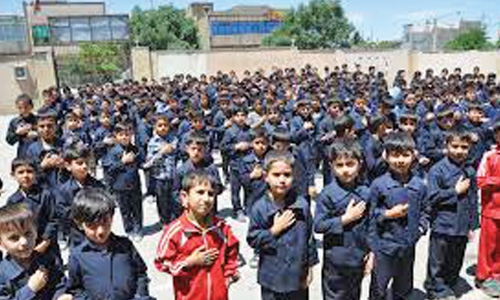Iran to ban teaching of English in primary schools
Tehran : Iran will ban the teaching of English in primary schools to stop the spread of a “cultural invasion” from the west, a senior education official said. Mehdi Navid-Adham, head of the state-run High Council of Education, told Iranian television that teaching English in state-run and privately owned schools was “against regulations and should not happen”. “In primary schools, the foundations should be laid to promote Farsi and Iranian culture,” he said late on Saturday.
His comments come after the biggest anti-regime protests in almost a decade, which the authorities blamed on a foreign conspiracy led by the US, Israel and Saudi Arabia. At least 21 people were killed in the protests, and hundreds of people were arrested, including about 90 students at Tehran university, according to some members of parliament. The unrest has largely ended. But President Hassan Rouhani is under pressure from regime hardliners to limit social and political freedoms, which have expanded since he took power in 2013.
The Telegram messaging app has been blocked since last week after it became a platform for protesters to organise rallies. It was also one of the main sources for people to circulate information and leaks about corruption within the ruling establishment. “The ban on English teaching might not be related to the protests, but it can spread despair in the country,” said a reformist politician. “It is not even do-able, with [many] families prioritising English in their children’s education.”
Learning a foreign language, as well as Arabic, is compulsory in high schools. But many privately run primary schools have also introduced English to their curriculums over past two decades. In 2012, the High Council of Education, which is affiliated to the education ministry, suggested that five other foreign languages — Italian, German, Spanish, Russian and French — should also be available. Ayatollah Ali Khamenei, Iran’s supreme leader, has repeatedly criticised the education system for not being Islamic enough. In 2016, he said it was “unhealthy” to have just English as the main foreign language. “Is it logical to promote their language with our own money?” he asked. Spanish, French and German could also be taught, he said, while insisting he did not mean to “stop teaching English at schools tomorrow”. Teachers doubted that the ban could be implemented. “This shows our education ministry officials are disconnected from the society,” said Fatemeh, a teacher at elementary school in Qarchak, a satellite town south-east of Tehran. Shiva, a teacher of English at an affluent northern Tehran school, also criticised the proposed ban. “Many private schools are competing with each other over their English classes and work on it as one of their competitive advantages,” SHE said. “This policy, if implemented, will affect lots of schools and families.”
Related Posts

